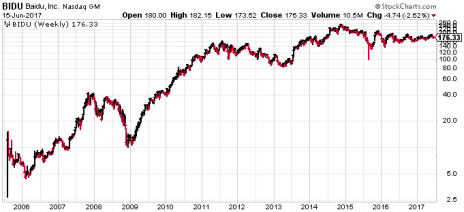I kicked off this series of Forever Stocks with an introduction that explained exactly what I mean by that term. If you missed it, you can read it here, near the end of the column. You’ll also see links to the first four 2017 Forever Stocks, if you need to catch up.
So, without further ado, Forever Stock #5 is Baidu (BIDU).
Baidu is often called the Google of China, and that may be all you need to know about the stock.
Baidu was founded in 2000, two years after Google (now officially known as Alphabet). Baidu has annual revenues of more than $10 billion, while Alphabet has revenues of $90 billion. Baidu grew its revenues at a 33% rate in 2015, while Alphabet grew at a 14% rate. Last year, Alphabet grew faster because of a Chinese slowdown, but by all accounts, Baidu’s growth will reaccelerate in 2017.
In other words: Baidu is smaller than Alphabet and growing faster.
And most important of all is the fact that the population of China is roughly four times as large as the population of the U.S.—which means that Baidu, roughly one-ninth the size of Alphabet today, is almost guaranteed to be larger in just a few years!
So let’s look at the chart.
BIDU came public in 2005, and has enjoyed three major waves of growth since then, with the latest peaking at 252 in November 2014. The correction that followed took the stock down as low as 100 at one point, but the stock has been trending slowly higher since then, performing roughly as well as the market. As I write, the stock has dipped down to its 50-day moving average at 175, and I think it’s a great buy here, especially if you plan to hold for 10 years or longer.
Note: BIDU was originally recommended by Paul Goodwin in Cabot Global Stocks Explorer (formerly Cabot Emerging Markets Investor). Paul’s latest issue shows him holding 11 stocks, 10 of which are profitable, and the average profits of those positions is 52%. If you’d like your portfolio to look as healthy, you can learn more here.
Alternatively, if international stocks are really not your thing, you could consider my own Cabot Stock of the Week, where cultivating long-term profits is one of my specialties. I have a profit of 1,200% in Tesla (bought in late 2011) and a profit of 120% in another stock (bought in March 2016), which I’ve also vowed to hold long-term. You can learn more here.
What are Forever Stocks?
Of all the ways to make money as an investor, perhaps the most rewarding is buying a stock when it is young and then holding that stock for a very long time, while it grows and grows and grows, bringing you profits topping 100%, 500%, even 1,000%.
Most experienced investors can easily name stocks that they wish they still owned—stocks that have doubled may times over the years. These include not only today’s big winners like Alphabet (GOOG), Amazon (AMZN), Apple (AAPL) Netflix (NFLX) and Tesla (TSLA) but also stocks that were previously hot and are bigger and growing more slowly now, like Carnival (CCL), Cisco (CSCO), Disney (DIS), Home Depot (HD) and Microsoft (MSFT).
But most investors who once owned these stocks don’t own them anymore.
So why are so few investors able to hold winning stocks long-term?
Because they get nervous about short-term concerns. Because they lack conviction. And often, because they become seduced by other stocks, and sell their old winners for modest profits instead of hanging on for the bigger, longer-term payoff.
And then, years later, they often wake up and say, “I wish I’d held onto those shares.”
So, my goal with this series has been to get investors to focus on the really long term, and to identify stocks that are likely to be worth holding over a really long term.
But note this—my goal has not been to identify stocks that can give you a modest long-term return, like Johnson & Johnson (JNJ) and DuPont (DD). Those stocks are fine for conservative investors working to keep their wealth, but my goal is to identify stocks that can make you rich!
I want to identify the next Amazon.com (AMZN), the next Apple (AAPL), the next Alphabet (GOOG) and the next Tesla Motors (TSLA).
The key attributes I look for in growth stocks are these:
- A product or service or business model that is revolutionary
- A product or service or business model that serves a mass market
- A company that’s still small enough to grow rapidly
- A company that is not respected—perhaps not even known—by the majority of investors.
- Last but not least, I look for a chart that shows that other investors have begun to recognize the company’s potential as well; that tells me that my thinking is on the right track.
Forever Stocks in this series:
Stock #1 was Autohome (ATHM), the Chinese company working to be the center of all consumer-oriented automobile information in China.
Stock #2 was Zillow (Z), the world’s largest online organizer of real estate information.
Stock #3 was Twitter (TWTR), supplier of a revolutionary new communications platform.
Stock #4 was SiteOne Landscape Supply (SITE), the national aggregator of landscape supply businesses.
[text_ad]
[author_ad]


